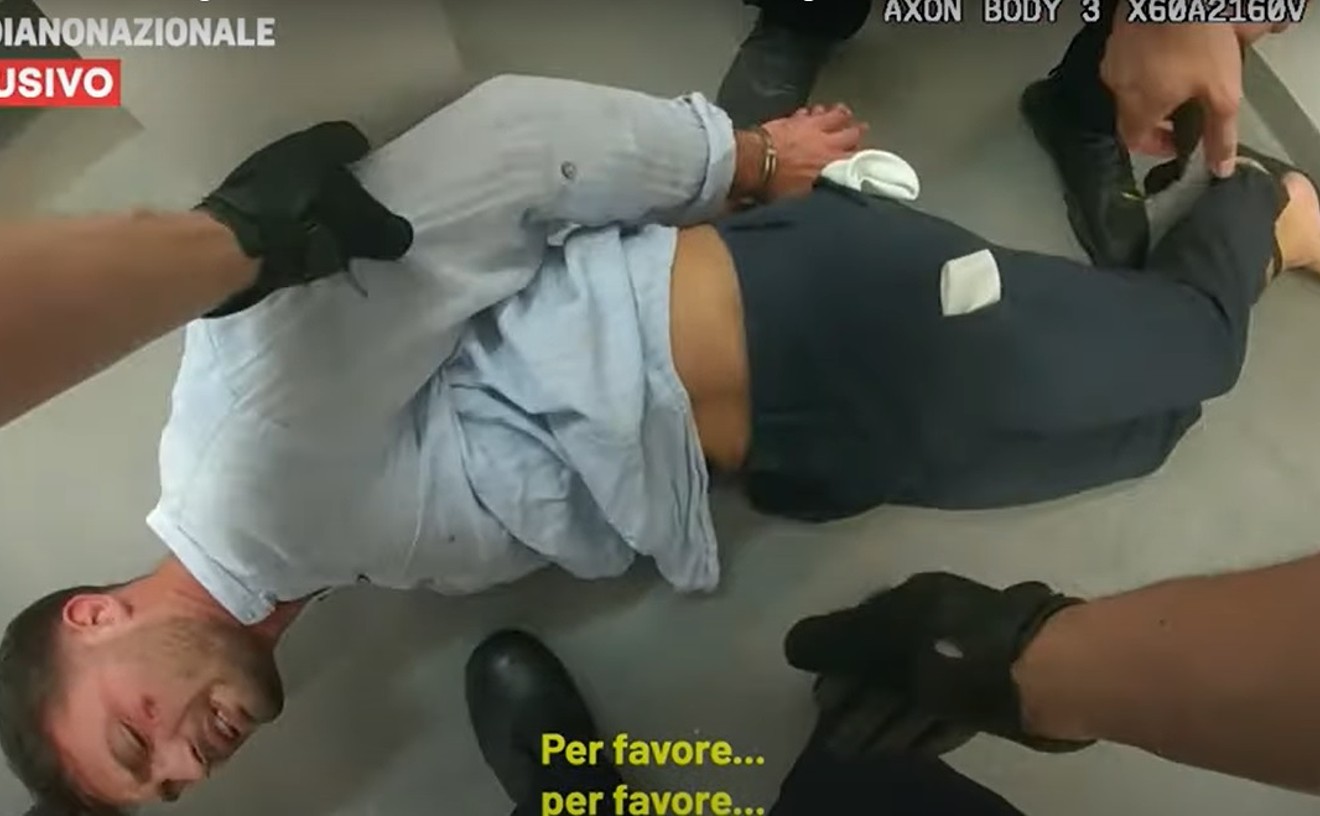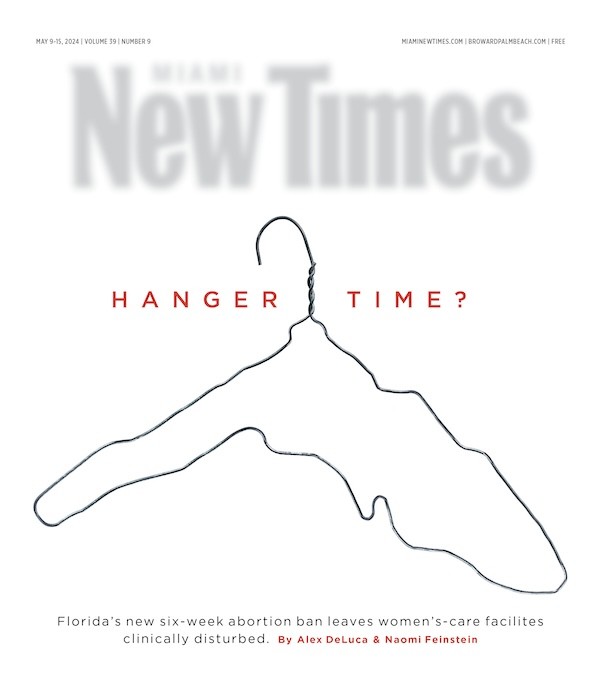What an amazing cast of characters in Jacob Bernstein's "Portrait of the Artist as a Litigant" (October 8)! A vicious gossip so envious of anyone truly famous that she grasps at anything despite the truth. A crybaby poet/artist so in need of publicity he screams to his lawyer about what the gossip says. And last but not least a true artist who is trying to earn an honest living and who did so without the help or obligation of the exile community.
It's obvious that Armando Valladares's reputation is more soiled by his attitude concerning a fellow artist than a place mat at La Carreta. He should just grow up and face the fact that Mario Valladares gets more exposure in one day at La Carreta than he can get with his army of lawyers and supporters.
How typical that a person so revered in the exile community would care little about freedom of expression and attempt to silence another artist with fear and intimidation. Didn't he learn anything since he was given permission to live in the United States?
Martin Alexander
Miami
Is Broadcasting a Privilege Only for the Privileged?
With regard to Kirk Nielsen's story "Making Airwaves" (October 1), I have a few opinions. Back in the Sixties, I worked at a small radio station in suburban Chicago. It was a great place to start and it's too bad stations like that -- where young, wannabe DJs can get a start -- aren't around any more. To blame the Federal Communications Commission for the crowded airwaves is like blaming Dadeland mall for its crowded parking lot.
I support WDNA-FM (88.9) public radio, which is currently broadcasting on a 7000-watt signal. They have excellent programmers and fine programs via satellite. Following Hurricane Andrew, the station went through a tough time getting its South Dade transmitter back up.
The staff at WDNA works hard to put out a quality product -- lawfully. But drive downtown, and as you approach the I-95 bridge over the Miami River, their signal is covered by someone's pirate signal. North of 79th Street another pirate signal on 88.7 has wiped WDNA right off the air. That rankles me.
Then there are occupational licenses, building and zoning codes, and sales tax on commercials that are blatantly ignored by pirate stations. To label this a free-speech issue is bullshit. Having a license to broadcast is a privilege, like driving a car or selling liquor or practicing medicine. None of us was born with a right to broadcast.
Having Kirk Nielsen provide the recipe for others to participate in this illegal, annoying enterprise is very much like Sound Advice running an ad for a new CD recorder that says you can copy records, tapes, and other CDs, and of course break a few copyright laws along the way. It all comes down to respect for the rights of others, not just Big Brother and the FCC.
John E. Brown
Miami
The FCC and Me
In 1957 I received a visit from the FCC for operating an illegal, unlicensed radio station. Two guys in suits arrived and explained the FCC code and the Communications Act of 1934.
A friend and I had put a fun station on the air. It dealt mainly with high school items: sports, teacher-student conflict, student parking locations. Mostly we talked or played music, but soon I was approached by other students offering me money to announce dedications with the songs. Wow, girls who would never talk to me were now offering me money to play a song!
The reason for our shutdown? Our signal was too close to Alan Freed, then the most popular DJ in the New York area. This was back in the days of AM radio.
We were on the air for about a month, and the FCC had us on tape almost from the start. We were not fined and none of our equipment was taken. Being juveniles seemed to help us.
Thanks for the interesting article.
William J. Weeks
Miami
Truly Sorry about DeFede's Felonious Conduct
There used to be a time when newspaper reporters reported the news and we, the grateful consumers of their thorough work, could orient ourselves to local and global events without too much interpretation. Those times are, alas, long gone as reporters and the press generally have morphed themselves into cultural critics, moral philosophers, FBI-type investigative operatives, and true-blue guardians of the public chastity. Most significantly, the reporter has become a self-promoting personality vying for media attention with legitimate newsmakers.
As a case in point, let us consider Jim DeFede's cynical article "I Am Truly Sorry" (September 24), in which he names four local politicians whose misdeeds produced unfortunate consequences for those individuals. DeFede then objects that Bill Clinton has had the benefit of an indulgent public response that excuses such misdeeds while condemning the press for obsessing over the private lives of public people.
DeFede is filled with self-pity about the difficulty of his going "after dishonest and unethical local politicians when the vast majority of Americans believe it is all right for Clinton to commit perjury, obstruct justice, and spew one bald-faced lie after another." The American public does not believe anything close to what DeFede states, but rather we tend to put our trust in the sort of due process that ousted from office three of his examples and denied the fourth a confirmation.
Isn't Bill Clinton the subject of an ongoing legal process, of which the Starr report was the first step? Do we wait for it to play out as we did with O.J. Simpson and Oliver North, or do we denominate ourselves as privileged persons, members of an elite press who need no such proceedings to arrive at a guilty verdict, quite able to convict on the basis of our own "insider" indictments? Did Clinton commit perjury? Why wait to find out? Did Clinton obstruct justice? Why not just take our friendly prosecutor's word for it? Should the American public continue to assess a public figure in the broad context of his or her times, overall motivations and intentions, tone, bearing, statements, and pattern of actions, or should we become schooled by DeFede and his colleagues in the investigative reporter's minimalist moralistic practice of Gotcha!, which assumes that if we uncover something fishy in a person's life, the entire life is thereby a proper target for self-righteous condemnation?
Besides being simple-minded, this approach contains a pervasive dynamic in contemporary journalism -- namely, affording an opportunity for journalists to characterize themselves as significant figures, crusaders for truth and justice, unappreciated arbiters of public morality, a far grander role, we must presume, than that of a plain reporter of the facts.
DeFede has himself committed a major felony in imposing upon us, his readers, an overwritten, ponderous excursion into high school humor and sophomore civics. For this he should be truly sorry, offer us a noncynical apology, and be forgiven.
George Robinson
Coconut Grove
Truly Sorry about Printing This Puerile Joke
I am shocked and appalled at the inferences in "I Am Truly Sorry." The head of our country said he was wrong and that he was sorry for having misled the people. Is DeFede forgetting that if there was not penetration, there must be exoneration?
Ronald Rickey
Miami Beach
Truly Sorry about Not Being 100% Lewinsky-Free
Jim DeFede does not realize that to most people, the issue is not whether Clinton lied but why he was asked in the first place. Does the word "materiality" mean anything to Mr. DeFede? How did we get from real estate to sexual harassment to "contact with the genitalia?"
It's not local politics we're talking about here, it's the presidency, and one man's unprecedented, unconstitutional, and therefore illegal attempt to bury the President of the United States. If the people prosecuting Joe Gersten or Bruce Kaplan or Humberto Hernandez had also broken the law or used illegal evidence in trying their cases, would that have mattered? How quickly we forget that one cannot break the law in order to catch criminals.
Manny Losada
Kendall
His Idea, Not Ours
This is in response to Ted B. Kissell's article "Monumental Ambivalence" (September 24), which closes with a quote from Jose Argote in which he states that the memorial to Jorge Mas Canosa in Miami Beach is "an initiative of the Latin Chamber of Miami Beach."
I would like to clarify that this monument is not an initiative of the Latin Chamber of Commerce of Miami Beach but rather an initiative by Luis Hernandez, who has spearheaded this effort independent of the Latin Chamber. The fact that he is the president of the Latin Chamber has no relationship to his proposal or efforts to erect the monument. With all due respect to Mr. Hernandez and the memory of Jorge Mas Canosa, the Latin Chamber has not been involved in the process of soliciting funds, making presentations or requests, or receiving any funding for this purpose.
Grace Calvani, executive director
Latin Chamber of Commerce of Miami Beach
Miami Beach
My Idea and Proud of It
I would like to include here part of my conversation with Ted B. Kissell that was not included in his article "Monumental Ambivalence."
I explained that the rationale behind recognizing the memory of Jorge Mas Canosa in Miami Beach was that Mr. Mas Canosa was a freedom fighter all his life and he and the organization he founded, the Cuban American National Foundation, have done more than any other organization on behalf of Cuban political refugees all over the world. A statue will help perpetuate the memory of his deeds so future generations of Cubans do not forget the high price paid in the fight for Cuban freedom; and after the liberation of Cuba is achieved, the high price paid for Cuba's liberty.
Other communities have created elaborate monuments to assure that future generations do not forget the terrible toll of oppression, and to ensure that it will never happen again.
Jose M. Argote, editor
Art Deco Tropical
Miami Beach
Editor's note: Last week the Miami Beach City Commission approved the concept of placing a memorial to Mas Canosa on public land. The city's art in public places committee will determine where and when it will be erected.
Victor's: A Disaster of Historic Proportions
Jen Karetnick's "To the Victor's Go the Spoils" (September 17) is one of the finest examples of poor journalism I have seen in a long time. As a graduate of the University of Miami's School of Communication and a former associate producer for a television news station, I have learned the importance of writing responsibly and without bias. Members of the media are entrusted with a power that is supposed to be used for the public good. Unfortunately, Karetnick's critique of Victor's Cafe seemed to have another goal in mind: destroying the business. A restaurant critic can seriously damage an establishment's reputation and must therefore write with caution. A critic must inform but not slander. I was appalled by the amount of negativity in her article. In fact I found it almost laughable.
Karetnick used words like putrid, plain, odorous, stinky, soupy, and tough to describe the entrees. The food was bad, the service was bad, the setting was bad, the host was bad, and of course the waiter was bad. I'm surprised the valet didn't crash her car.
If everything happened the way Karetnick described it, this event could very well go down as one of the worst dining experiences in restaurant history. Either that or it should be made into a skit on Saturday Night Live. Frankly, the amount of exaggeration in the article killed its credibility. And the fact that New Times published it kills the paper's credibility.
Newspapers should be more careful about what they publish. Some people might be tempted to think that because they see it in print, it's true.
D. Lasa
Miami
Victor's: Perhaps a Vendetta?
In the many years I have been perusing New Times, I have never read such a derogatory article about any restaurant (and there are many that really deserve it). The language was indicative of some sort of vendetta.
Since the new owners reopened Victor's (a white elephant that a Miami politico hammered into Victor Del Corral's head), I have patronized it frequently and have never had the displeasures Ms. Karetnick had. In fact, the service and food have been very good, the new patrons are quite content, and the owners are always very attentive.
In short, I think the new owners will save Victor's.
Juan Valdes-Pages
Coral Gables
Victor's: Perhaps a Hidden Agenda?
My wife and I dine out at least four times a week, so you can imagine the degree of scrutiny on our part when it comes to judging a restaurant's service and, above all, its food quality.
I also realize that anyone can have a bad experience on any given day at any restaurant. When reading Jen Karetnick's article regarding her recent experience at Victor's Cafe, however, one cannot fail to detect a biased overkill in the way she described what appears to have been (to her) a horrible sequence of events.
Granted, I was not there, but having known [Victor's owner] Jose More for many years as an individual and as a great restaurant operator, it is hard for me to believe so many things went wrong that night without his detection and involvement. The article came across as an exaggeration at best, and at worst as a hatchet job for reasons known only to Ms. Karetnick.
I am the current president of the Hispanic American Business Association, and for the last three years we have held our monthly luncheons at Victor's. We have always enjoyed the hospitality, service, and without question great food. I submit personally and on behalf of the board of directors of the association that under Mr. More's administration, we are not missing one iota of the usual hospitality, service, and food quality so representative of Victor's.
Ms. Karetnick has the right to her opinion, but she also has a great responsibility as a journalist able to reach multitudes and to shape public opinion. I hope no hidden agenda motivated this article, which was uncharacteristic for New Times. It would be terrible for me to lose respect for a publication that has demonstrated many a time its character and most important, its fairness.
Tony Marin
Miami
Victor's: 60 Well-Known Professionals Can't All Be Wrong
My wife and I wholeheartedly disagree with Jen Karetnick's disparaging article. We recently hosted a party of 60 well-known professionals at Victor's Cafe and have dined there with friends on numerous occasions. The new owner, Jose R. More, was always on hand to greet us and extend a very warm welcome.
We and our friends have truly enjoyed the excellent quality of service, Cuban-American cuisine, refreshments, Spanish ambiance, and flavor of this outstanding restaurant and lounge.
Jonathan and Lilliam Johnston
Coral Gables
Victor's: Blame the Vintner
I was very surprised to read Jen Karetnick's article because I never thought someone would actually do harm to a person who has done nothing wrong.
Mr. Jose More does not make wine; he buys and serves wine in his restaurant. So of course there is a possibility the wine could have been spoiled, but Ms. Karetnick cannot blame him. He only purchased the wine, he did not make it. So if Ms. Karetnick would like to complain about the wine, she needs to call or write to the wine company that makes the wines.
I am the wedding specialist at A Matter of Taste catering, and my biggest problem is that potential customers who are holding their wedding parties at Victor's Cafe are threatening to cancel because they were very disturbed by the article. I strongly believe that before you write something that is going to ruin someone's reputation, you should think who else is going to be affected by such nonsense.
Lucia Alfonso
Coral Gables










